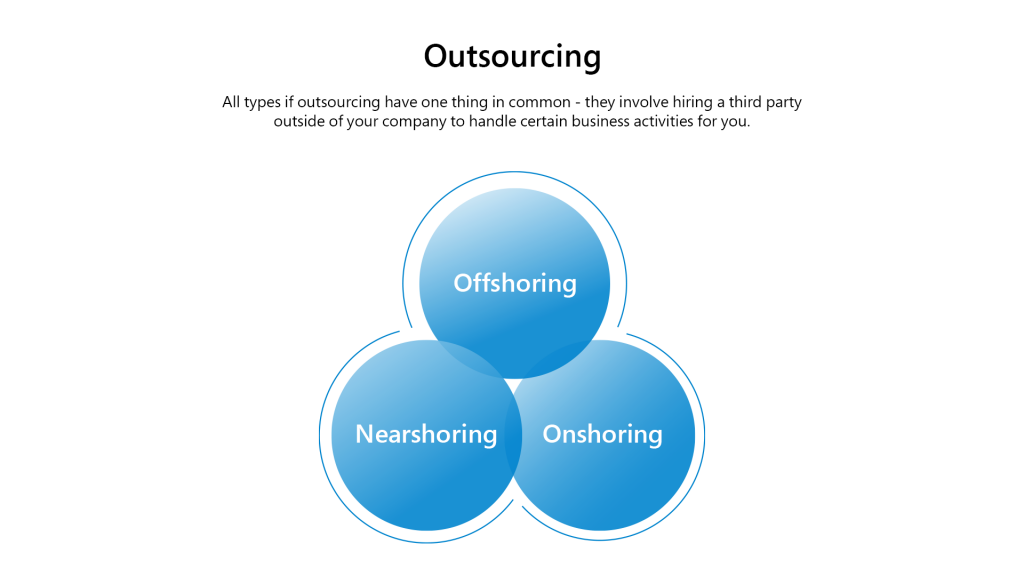June 2, 2021 | Digital Marketing, Outsourcing

As rightly said by the American Economist Janet Yellen, outsourcing is the trade that shows us a cheaper way of getting work done by experts in the field.
Outsourcing is where one company hires another to execute a plan or activity that can’t be done internally or needs extra expertise.
E.g., most companies hire recruiting agencies to recruit new staff with specific JDs.

Onshoring: where the services are from within the country.
Nearshoring: where services are from the neighboring countries or that within the same time zone.
Offshoring: where the services are from a distant country.
As the services are hired from outside, the cost of hiring or training is saved. One does not have to hire or train personnel for the task. Instead, just source it out from already trained experts.
Outsourcing allows the person to focus on what they do best and contract with other people to provide what they are better positioned to provide. This makes their job more meaningful and increases their efficiency. This also provides them job satisfaction.
Outsourcing helps divide the work and focus on what’s done best by the staff. This allows them to derive maximum benefit from their strengths and talents. The involvement of specialists usually means faster execution.
Time to market is a fundamental and crucial concept for the products of the company. Outsourcing saves cost and time for the same. It helps save cost as the company doesn’t have to hire staff and train them to do the work. The outsourcing personnel is already experts in the field, and thus a lot of time is saved while applying it. Therefore, outsourcing services accelerates the time to market and generates revenue faster.
Outsourcing reduces costs by at least 30%. For certain businesses, certain tasks are time-consuming to be done in-house. And outsourcing here helps to reduce cost and time invested in these tasks and increases flexibility and quality of the work. Outsourcing allows us to keep labor costs low overall.
Outsourcing big tasks also give access to innovation. This means outsourcing of management, strategic research, intellectual capabilities, etc. This means the stakes are higher but so is the return. This also means the company gets experts to work on the project or service, which gives more significant benefits to the company.
The service provider is from the outside, and thus one might not have communication before starting the job. Even after the start, many issues like different time zones or playing phone tag, or trouble in email communications occur. This can disrupt the project and waste the time of the employer and the service provider.
As the project is outsourced, the company does not have full-time control over it. This makes things difficult. A regular communication chain needs to be maintained between the service provider and the company. Otherwise, the service provider may miss the client’s mark, which can create havoc.
A freelancer might have more than one client, and this particular project might not be their main priority. Thus, respecting their time and giving them space to get the work done is very important. Because hurrying faster might spoil the project, and this can impact the reputation of the company.
These are some of the pros and cons of outsourcing services. Outsourcing helps businesses save time and energy by hiring new staff and training them and saves their cost of training and pay. Thus, companies prefer outsourcing certain projects or services to other companies that have and expertise in the same. This saves their time, money, labor and takes the load off the employees who can focus on their strengths and abilities to provide the best results.
Outsourcing Software Development is beneficial when the company wants to save its time and costs and wants to fasten the process of the project or service. Companies use outsourcing to use the expertise of the field in their projects or services. This way it saves the time of hiring and training the staff and saves the cost for the same. Outsourcing is cheaper and more beneficial to the organization.
In conclusion, outsourcing is used to save time, money and use expert knowledge of the field.